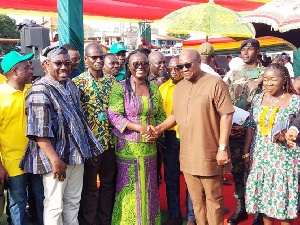- Home - News
- Elections 2024
- News Archive
- Crime & Punishment
- Politics
- Regional
- Editorial
- Health
- Ghanaians Abroad
- Tabloid
- Africa
- Religion
- Photo Archives
- Press Release
General News of Monday, 14 April 2025
Source: www.ghanawebbers.com
$400m Annual Importation Of Chicken Is A Shame -Mahama
President Mahama visited Techiman yesterday. He stated that Ghana imports nearly $400 million worth of chicken each year. This, he said, should be a source of shame for Ghanaians. He announced plans to support 54 individuals in producing four million birds. This would equal 10,000 metric tons of chicken.
The President emphasized his government's commitment to livestock development. This includes improving cattle production and small ruminants like goats and sheep. He also mentioned enhancing access to high-quality breeds.
Mahama launched the Feed Ghana Programme in Techiman, Bono East Region. The programme aims to improve livestock production and infrastructure. It will include irrigation systems, better roads, power supply, and warehousing facilities. These improvements are intended to attract private investment.
The President believes this programme will boost agricultural production and processing. He presented maize seeds, fertilizers, a Kia truck, and tractors to various institutions. These included the Ghana Prisons Service and National Service Authority.
He called for unity in transforming agriculture for national growth. The Feed Ghana Programme is a proactive initiative rather than just a policy. Despite challenges in the sector, he remains optimistic about its success.
Mahama urged farmers, agribusinesses, financial institutions, and partners to collaborate on the programme's goals. The initiative aims to increase food production through modern farming techniques and improved infrastructure.
Key interventions include establishing farmers’ service centres nationwide. These centres will offer services like mechanization, quality inputs, financial support, market access, primary processing, and training for farmers.
The President announced plans for farm banks or land banks in irrigable zones. This will support young agri-entrepreneurs and enhance national food production.
The second component focuses on grains and legumes development. It aims to increase maize, rice, soya beans, and sorghum production for consumption and export.
The third component promotes local vegetable cultivation through the ‘Yeredua’ project. This aims to reduce imports from neighboring countries by growing vegetables locally.
Mahama stressed investing in controlled environmental farming technologies like greenhouses. He encouraged urban agriculture and schools growing their own vegetables through backyard gardening.
The fourth component promotes institutional farming for households and communities. It supports cultivating vegetables such as tomatoes and peppers for self-sufficiency.
Support will also extend to Senior High Schools for crop production and livestock farming initiatives.
Finally, the fifth component revitalizes the poultry industry with the “NkokoNketenkete” project.











